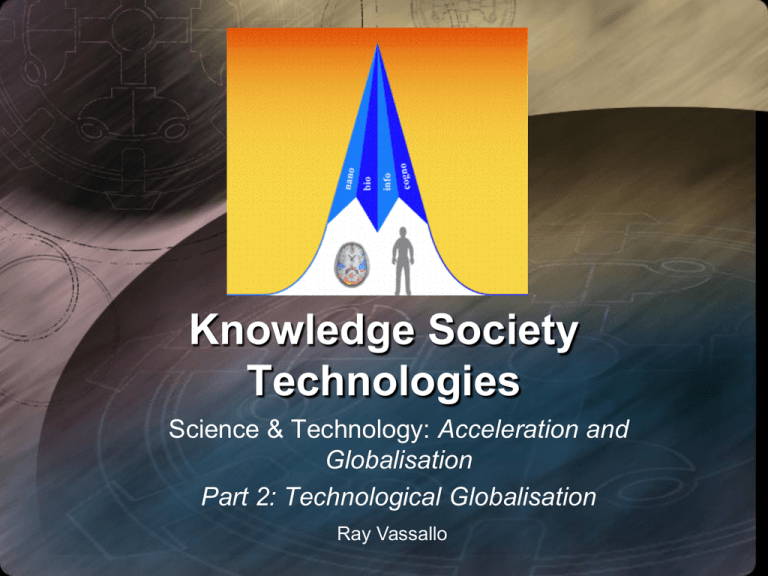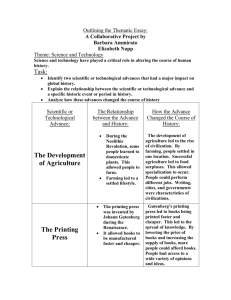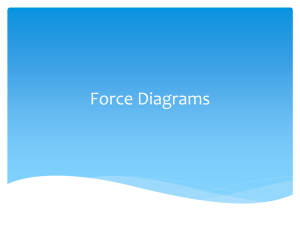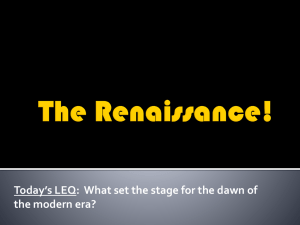KST_02_-_Technological_Globalisation
advertisement

Knowledge Society Technologies Science & Technology: Acceleration and Globalisation Part 2: Technological Globalisation Ray Vassallo Technological Globalization: Winners Globalization is less a choice than a statistical inevitability, once we have accelerating, globe-spanning technologies (communication, databases, travel) on a planet of finite surface area (“sphericity”). There are some clear winners in this phase transition, such as: 1. Network Memes and Traditions like Free Markets, Democracy, Peace and other Interdependencies (The Ideas that Conquered the World, Michael Mandelbaum) 2. Big Cities (backbone of the emerging superorganism) (Global Networks, Linked Cities, Saskia Sassen) 3. Global Corporations (large and small) © 2004 Accelerating.org (New World, New Rules, Marina Whitman) Technological Globalization: Losers Some of the longer term losers: 1. 2. 3. 4. Non-Network Memes and Traditions like Autocratic Systems, Fascism, Indefinite Protectionism (Power and Prosperity, Mancur Olson) Centrally-Planned (mostly Top-Down) vs. Market-Driven (mostly Bottom-Up) Economies (The Commanding Heights, Daniel Yergin) (Against the Tide, Douglas Irwin) Groups or Nations with Ideologies/Religions (The Clash of Civilizations, Samuel Huntington) Centrally-Planned vs. Self-Organizing Political Systems (excepting critical systems, like Security) (The Future and Its Enemies, Virginia Postrel) Technological Globalization: Uncertains Most elements of modern society, of course, are evolutionary, meaning they remain ‘indeterminate’ actors which may or may not become winners. Their fate depends critically on the paths we choose. Some key examples: 1. Humanist Memes like Justice, Equal Opportunity, 2. Individual Responsibility, Education, Charity, Compassion, Cultural Diversity, Sustainability, Religious Tolerance (The Dignity of Difference, Jonathan Sacks) The Unskilled Poor (In All Economies, U.S. to Uganda) (A Future Perfect, Micklethwait and Wooldridge) The Developing World (The Mystery of Capital, Hernando de Soto) 3. Something Curious Is Going On © 2004 Accelerating.org Big Bang to Complex Stars: The Slowing Phase of ED © 2004 Accelerating.org From Biogenesis to Intelligent Technology: The “Accelerating Phase” of Universal ED Carl Sagan’s “Cosmic Calendar” (Dragons of Eden, 1977) Each month is roughly 1 billion years. © 2004 Accelerating.org A U-Shaped Curve of Change? Big Bang Singularity Developmental Singularity? 50 yrs: Scalar Field Scaffolds 50 yrs ago: Machina silico 100,000 yrs: Matter 100,000 yrs ago: H. sap. sap. 1B yrs: Protogalaxies 8B yrs: Earth © 2004 Accelerating.org Brief History of Accelerating Change Billion Years Ago Generations Ago 12 Big Bang 11.5 Milky Way (Atoms) 8 Sun (Energy) 4.5 Earth (Molecules) 3.5 Bacteria (Cell) 2.5 Sponge (Body) 0.7 Clams (Nerves) 0.5 Trilobites (Brains) 0.2 Bees (Swarms) 0.100 Mammals 0.002 Humans, Tools & Clans Co-evolution 100,000 Speech 750 Agriculture 500 Writing 400 Libraries 40 Universities 24 Printing 16 Accurate Clocks 5 Telephone 4 Radio 3 Television 2 Computer 1 Internet/e-Mail 0 GPS, CD, WDM Observation 1: Tech Interval Time Compression 3 million years ago collective rock throwing; early stone use 1.5 million years ago lever, wedge, inclined plane 500,000 years ago control of fire 50,000 years ago bow and arrow; fine tools 5,000 years ago wheel and axle; sail 500 years ago printing press with movable type; rifle 50 years ago commercial digital computers 10 years ago commercial internet Continuous Tech Innovation (Even 4001400 A.D., Fall of Rome to Black Plague) Technological or Sociotechnological Innovation Date (A.D.), Location Alchemy (pre-science) develops a wide following Constantinople University Powers and Roots (Arybhata) Heavy plow; horse shoes; practical horse harness Wooden coffins (Alemanni) Draw looms (silk weaving) Decimal reckoning Canterbury Monastery/University Book printing Suan-Ching (Science Encyclopedia) Originum Etymologiarum Liibri XX (Sci. Encyc.) First surgical procedures Water wheel for milling (Medieval energy source) Stirrup arrives in Europe from China Early Chemistry (Abu Masa Dshaffar) 410, Europe 425, Turkey 476, India 500, Europe 507, Germany 550, Egypt 595, India 598, England 600, China 619, China 622, Spain 650, India 700, Europe 710, Europe 720, Mid-East Continuous Tech Innovation (400-1400 A.D., Fall of Rome to Black Plague) Medicine, Astronomy, Math, Optics, Chemistry Hanlin Academy Pictorial Book Printing Iron and smithing become common; felling ax Chemistry (Jabir) Mayan Acropoli (peak) Algebra (Muhammed al Chwarazmi) Ptolemaic Astronomy; Soap becomes common Rotary grindstone to sharpen iron Paper money Salerno University Iron becomes common; Trebuchets Astrolabe (navigation) Angkor Thom (city) New Mathematics and Science (Jahiz, Al-Kindi) Viking shipbuilding © 2004 Accelerating.org Paper arrives in Arab world 750, Arab Spain 750, China 765, Japan 770, Europe 782, Mid-East 800, Mexico 810, Persia 828, Europe 834, Europe 845, China 850, Italy 850, Europe 850, Mid-East 860, Cambodia 870, Mid-East 900, Europe 900, Egypt Continuous Tech Innovation (400-1400 A.D., Fall of Rome to Black Plague) Salerno Medical School Linens and woolens First European bridges Arithmetical notation brought to Europe by Arabs 1,000 volume encyclopedia First Mayan and Tiuanaco Civilizations Horizontal loom Astrolabe arrives in Europe Greek medicine arrives in Europe (Constantine) Water-driven mechanical clock Antidotarum (2650 medical prescriptions) Bologna University Mariner's compass Town charters granted (protecting commerce) Al-Idrisi's "Geography" Oxford University Vertical sail windmills 900, Italy 942, Flanders 963, England 975, Europe 978, China 1000, Cent./S.America 1000, Europe 1050, Europe 1070, Europe 1090, China 1098, Italy 1119, Italy 1125, Europe 1132, France 1154, Italy 1167, England 1180, Europe Continuous Tech Innovation (400-1400 A.D., Fall of Rome to Black Plague) Glass mirrors Second Mayan Civilization Cambridge University Arabic numerals in Europe (Leonardo Fibonacci) Tiled roofs Cotton manufacture Coal mining Roger Bacon, our first scientist (Opus; Communia) Goose quill writing pen The inquisition begins using instruments of torture Tradesman guilds engage in street fighting over turf Toll roads Human dissection Wood block printing; spectacles Standardization of distance measures (yard, acre) Use of gunpowder for firearms (Berthold Schwarz) Sawmill; wheelbarrow; cannon (large and hand) 1180, England 1190, Cent. America 1200, England 1202, England 1212, England 1225, Spain 1233, England 1250, England 1250, Italy 1252, Spain 1267, England 1269, England 1275, England 1290, Italy 1305, England 1313, Germany 1325, Europe Continuous Tech Innovation (400-1400 A.D., Fall of Rome to Black Plague) Pisa and Grenoble Universities; Queens College First scientific weather forecasts (William Merlee) Mechanical clock reaches Europe Blast furnaces; cast iron explodes across Europe Steel crossbow first used in war Vienna, Hiedelberg, and Cologne Universities Incorporation of the Fishmonger's Company Johann Gutenberg, inventor of mass printing, born 1330, Europe 1337, England 1354, France 1360, Europe 1370, Europe 1380, Europe 1384, England 1396, Germany Lesson: Tech innovation appears to be a developmental process, independent of Wars, Enlightenments, Reformations, Inquisitions, Crusades, Subjugations, and other aspects of our cyclic evolutionary ideological, cultural, and economic history. Tech advances are something we consistently choose, even unconsciously, regardless of who is in power, because they have strong "non-zero sum" effects on human aspirations. Meta-Trends in Technological Acceleration •Moore's Law - Miniaturization • Processing, Storage, ... • Price/Performance 2X over 12-18 months •Metcalf's Law - Interconnection • Value of a network increases as the square of the number connections •Gilder's Law - Quantization • Bandwidth increases 3X every 36 months •Negroponte's Law - Digitization • Superiority of "bits over atoms" • Profound impact felt in "Knowledge Economy" where ideas are ultimate raw material © 2004 Accelerating.org





